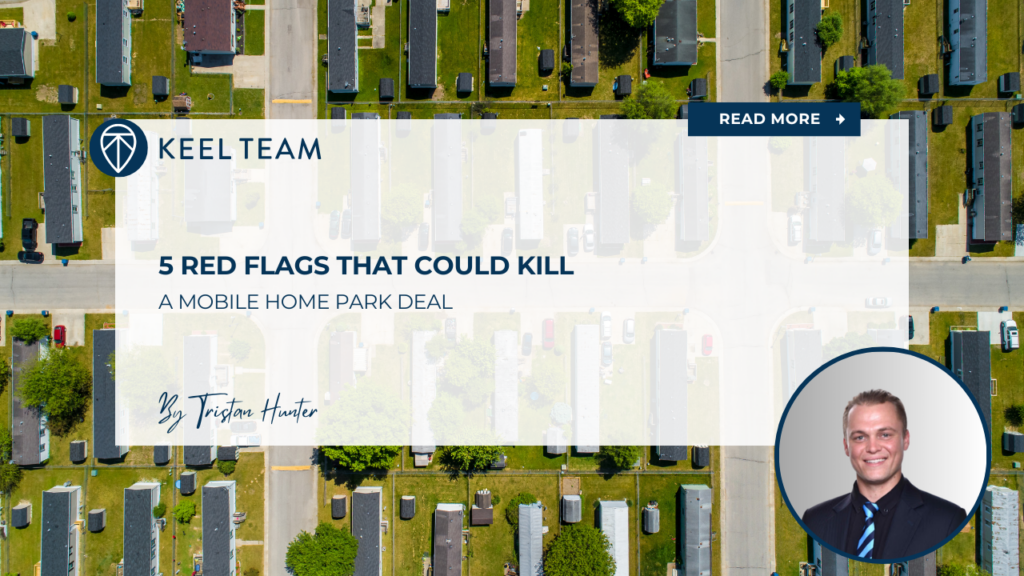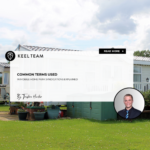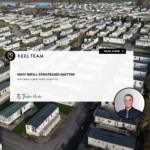5 Red Flags That Could Kill a Mobile Home Park Deal
-
 Tristan Hunter - Investor Relations
Tristan Hunter - Investor Relations

Investing in a mobile home park can be a smart move. The cash flow potential, affordable housing demand, and value-add opportunities make it attractive to both new and experienced investors. However, not every mobile home park deal is a good one. Some deals hide problems that can turn a promising opportunity into a costly mistake. Here are five red flags that could kill a mobile home park deal—if not caught early.
1. Private Utilities with Unclear Responsibility
One of the biggest potential headaches in a mobile home park investment is dealing with private utilities. While public water and sewer systems are generally more reliable, many mobile home parks use private systems like wells, septic tanks, or lagoons.
That alone isn’t always a dealbreaker, but the key issue is uncertainty. If the seller can’t provide clear documentation about system maintenance, age, permits, or inspection history, proceed with caution. In some cases, replacing a failed private system can cost six figures and take months of permitting and construction.
What to watch for:
- No written maintenance logs
- Vague or missing permits
- Environmental violations or unresolved compliance issues
- Seller shrugs off questions about infrastructure
It’s wise to bring in utility experts during due diligence. While private systems aren’t always bad, unclear records or signs of deferred maintenance can signal major risk.
Download our FREE eBook on the Top 20 things to know BEFORE investing in mobile home parks!
2. Heavy Park-Owned Home Presence
Mobile home parks that own a large number of homes present a very different business model. When a mobile home park owns the homes, it takes on the role of both landlord and community operator. This can lead to higher turnover, more maintenance issues, and unpredictable expenses.
There’s nothing inherently wrong with mobile home parks that include owned units, but the more the park owns, the more you need to scrutinize operations. Often, sellers inflate the value of these homes or understate ongoing repair needs.
Why it matters:
Resident-owned homes tend to stay longer and treat the property better. Park-owned homes, on the other hand, often require constant attention, maintenance crews, and capital for turnover.
Watch out for:
- Mobile home parks where 50% or more of the units are park-owned
- Poor condition or incomplete records on mobile homes
- Inflated rent figures that include unverified home payments
- Turnover rates that aren’t clearly tracked
You may still pursue the deal, but adjust your underwriting and operational expectations.
3. Low Lot Rents With No Upside
Lot rent is the foundation of mobile home park income. If the current rents are far below market but local rent control or tenant protections limit your ability to raise them, that’s a problem.
Sometimes, sellers price a mobile home park based on “pro forma” income—what could happen if rents were raised. But if you legally or ethically can’t raise rents to that level, your return may never match the seller’s projections.
What to look out for:
- Rents $100–$200 below market with no explanation
- Local laws that restrict rent increases
- Resistance from tenants or community pressure groups
- Seller assumptions that rents can be doubled overnight
Look into local laws, talk to a zoning attorney, and confirm that rent increases are both legal and reasonable based on the condition and quality of the mobile home park.
4. Bad Tenants or a Poor Collection Track Record
Tenant quality can make or break your mobile home park operation. If the current owner has allowed rent collections to slip, ignored rule enforcement, or created a culture of leniency, you could inherit a mess.
You might hear a seller say, “The tenants are great! They just pay late sometimes.” That’s a red flag.
You need to see actual rent rolls, payment history, and eviction records. If 20% of the tenants haven’t paid rent in three months, that will hit your cash flow hard from day one.
Signs to investigate:
- Incomplete or manually edited rent rolls
- Large balances of past-due rent
- High turnover and move-outs
- Mobile home park rules that aren’t enforced
Sometimes, poor collections stem from an overwhelmed owner. But even then, fixing the problem takes time, effort, and legal fees.

5. Title Issues or Zoning Problems
This red flag might not be obvious at first, but it can stop a deal dead in its tracks. Some older mobile home parks were built before modern zoning rules and may not comply with current land use laws. Others might have unclear titles, shared parcels, or encroachments.
If the mobile home park doesn’t have the legal right to operate as-is, your investment could be at risk. Even worse, lenders may refuse to finance it.
Warning signs:
- The zoning doesn’t specifically mention mobile home park use
- Seller avoids title or plat map discussions
- Inconsistent lot sizes or irregular parcel boundaries
- No permits for additions or expansions
Always conduct a full title search and zoning review. Your attorney should confirm that the mobile home park has a legal, non-conforming use status if it’s operating under grandfathered conditions. Without that, you could be investing in a ticking time bomb.
How to Protect Yourself
Catching red flags early doesn’t mean the deal is dead—it means you can renegotiate, restructure, or walk away with confidence. Here are a few tips to protect yourself:
- Hire experienced inspectors and attorneys during due diligence.
- Ask for real documentation, not just verbal promises.
- Underwrite conservatively, especially if anything seems unclear.
- Visit the property in person to verify what’s being presented.
- Talk to current tenants, nearby property managers, and local officials if possible.
Every mobile home park deal has quirks, but the goal is to find manageable issues, not ticking time bombs. With the right approach, you can spot red flags before they cost you money—or worse, your reputation.
Final Thoughts
No deal is perfect, and no mobile home park comes without risk. But by knowing what to look for, you can avoid the deals that bring more trouble than return. Keep your eyes open, ask the right questions, and never assume anything. The red flags are there—you just have to spot them before they become your problem.
Want help reviewing a potential mobile home park deal? Let us know—we’ve seen the good, the bad, and the ugly.
Are you looking for MORE information? Book a 1-on-1 consultation with Andrew Keel to discuss:
- A mobile home park deal review
- Due diligence questions
- How to raise capital from investors
- Mistakes to avoid, and more!
Disclaimer:
The information provided is for informational purposes only and is not investment advice or a guarantee of any kind. We do not guarantee profitability. Make investment decisions based on your research and consult registered financial and legal professionals. We are not registered financial or legal professionals and do not provide personalized investment recommendations.

Tristan Hunter - Investor Relations
View The Previous or Next Post
Subscribe Below 👇





